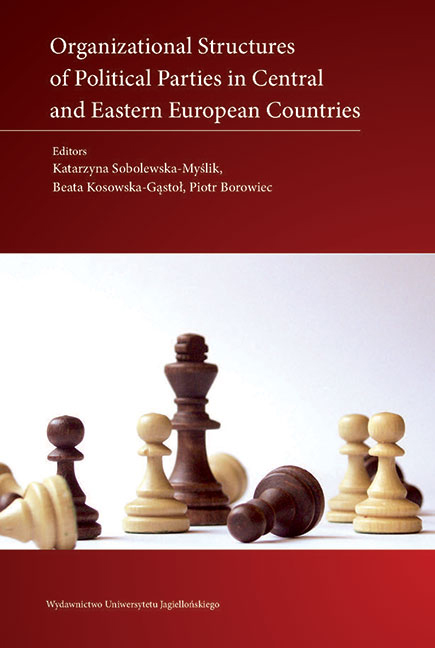Book contents
- Frontmatter
- Contents
- Preface
- Developing Party Structures in Central and Eastern Europe
- Albania: Organizations of Political Parties in Albania
- Belarus: Belarusian Political Parties: Organizational Structures and Practices
- Bosnia and Herzegovina: Organizational Structures of Political Parties in CEE Countries: A Case Study on Bosnia and Herzegovina
- Bulgaria: Organizational Structure and Trends in Bulgarian Party Politics
- Croatia: Organizational Structures of Political Parties in Croatia
- Czech Republic: Between Organizational Extremes: Czech Parties after a Political Earthquake
- Estonia: Organizational Structures of Political Parties in Estonia
- Hungary: Cut from the Same Cloth? A Comparative Analysis of Party Organizations in Hungary
- Kosovo: Structure of the Main Political Parties in Kosovo
- Latvia: Leader-Centered and Power-Hungry: Party Organizations in Latvia
- Lithuania: Organization of Political Parties: The Case of Lithuania
- Moldova: Organizational Structures of Political Parties in The Republic of Moldova
- Montenegro: Party Organization in Montenegro: Structural Resemblance Behind Political Divergence
- Poland: Structures of Polish Political Parties in the Second Decade of the 21st Century
- Romania: The Internal Organization of Romanian Political Parties
- Russia: Parties with Roots Growing Upwards: Organizational Features of Russian Political Parties
- Serbia: Organizational Structures of Political Parties in Serbia
- Slovakia: Organizational Structures of Political Parties in Slovakia: Parties not for Members
- Slovenia: Almost without Any Innovations: Organizational Structures in Slovenian Parties
- Ukraine: Shallow Party Structures in a Volatile Party System
- Comparing Organizational Structures of Political Parties in Central and Eastern European Countries
- Biographical notes about the authors
Bulgaria: Organizational Structure and Trends in Bulgarian Party Politics
- Frontmatter
- Contents
- Preface
- Developing Party Structures in Central and Eastern Europe
- Albania: Organizations of Political Parties in Albania
- Belarus: Belarusian Political Parties: Organizational Structures and Practices
- Bosnia and Herzegovina: Organizational Structures of Political Parties in CEE Countries: A Case Study on Bosnia and Herzegovina
- Bulgaria: Organizational Structure and Trends in Bulgarian Party Politics
- Croatia: Organizational Structures of Political Parties in Croatia
- Czech Republic: Between Organizational Extremes: Czech Parties after a Political Earthquake
- Estonia: Organizational Structures of Political Parties in Estonia
- Hungary: Cut from the Same Cloth? A Comparative Analysis of Party Organizations in Hungary
- Kosovo: Structure of the Main Political Parties in Kosovo
- Latvia: Leader-Centered and Power-Hungry: Party Organizations in Latvia
- Lithuania: Organization of Political Parties: The Case of Lithuania
- Moldova: Organizational Structures of Political Parties in The Republic of Moldova
- Montenegro: Party Organization in Montenegro: Structural Resemblance Behind Political Divergence
- Poland: Structures of Polish Political Parties in the Second Decade of the 21st Century
- Romania: The Internal Organization of Romanian Political Parties
- Russia: Parties with Roots Growing Upwards: Organizational Features of Russian Political Parties
- Serbia: Organizational Structures of Political Parties in Serbia
- Slovakia: Organizational Structures of Political Parties in Slovakia: Parties not for Members
- Slovenia: Almost without Any Innovations: Organizational Structures in Slovenian Parties
- Ukraine: Shallow Party Structures in a Volatile Party System
- Comparing Organizational Structures of Political Parties in Central and Eastern European Countries
- Biographical notes about the authors
Summary
Extant research on political parties focuses exclusively on their ideological specifics, strategic choices during elections, and policy performance when in government. More recently, scholars have started to emphasize the importance of organizational principles of party building and internal party operation for the overall level of democratic performance in a country. Numerous polls over the last several years have indicated that the level of citizens’ trust in political parties and national parliaments is at an all-time low. This raises questions about the democraticness of parties and the connections they build to society. This concern is especially troubling in the case of emerging party systems in countries undergoing democratic transitions, such as those in Eastern Europe. As carriers of the very idea of pluralism in democratic representation, post-Communist political parties have been key actors in the process of transition. Success in developing solid party structures and clear procedures would likely help those parties fulfill a very important mission: transformation of Eastern European post-Soviet bloc countries into vibrant modern democracies. This chapter explores whether political parties have been able to grow organizationally and develop democratically in the region by assessing the extent of institutional sophistication of major political parties in the context of Bulgaria.
Since the revolutions of 1989, the Bulgarian party system has undergone important transformations. Throughout the 1990s, it changed from a one-party totalitarian system to a multi-party competitive system. During this period, two formidable political forces, namely the ex-Communist Bulgarian Socialist Party (BSP) and the Union of Democratic Forces (UDF) – and to a lesser degree the smaller ethnic minority Movement for Rights and Freedoms (MRF) – dominated the political arena. Since 2001, new parties have not only continued to emerge, but have also gained victories in Bulgarian elections (see Table 1). The organizational capacity developed by transition-era parties is no longer an advantage, and newcomers have made significant advances with little organization and modest resources. As this study reveals, both the institutional context and the choices made by Bulgarian parties have shaped a reality in which organizational structure and procedure vary widely with regard to power distribution and degree of intra-party democracy.
- Type
- Chapter
- Information
- Organizational Structures of Political Parties in Central and Eastern European Countries , pp. 85 - 108Publisher: Jagiellonian University PressPrint publication year: 2017



